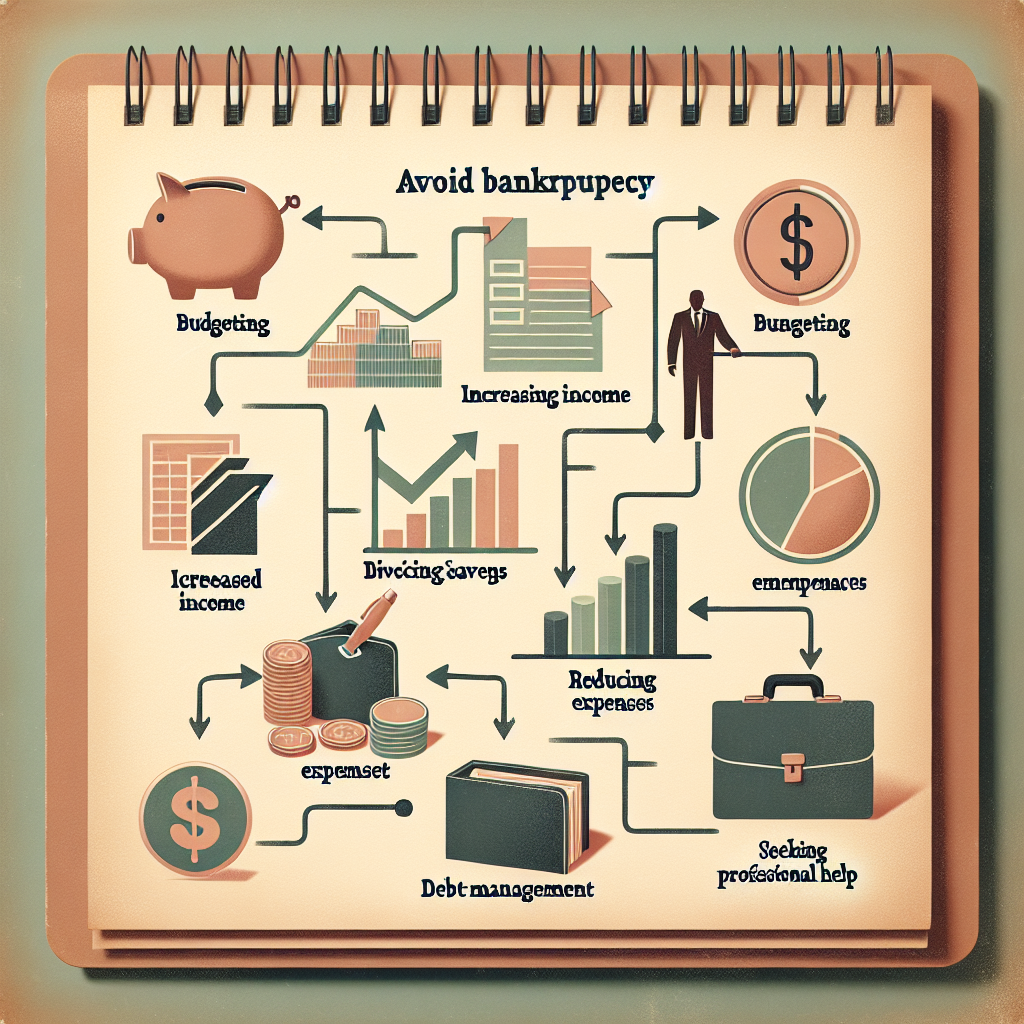Avoiding bankruptcy is a crucial concern for individuals and businesses facing financial difficulties. While bankruptcy can offer relief from overwhelming debt, it also carries long-term consequences that can impact credit scores, reputation, and financial stability. To steer clear of bankruptcy, it’s essential to understand your financial health, develop a strong financial plan, consider legal advice, and implement cost-cutting strategies. This article delves into each of these areas, providing actionable insights and resources to help you navigate financial challenges effectively.
Evaluating Financial Health and Warning Signs
Evaluating your financial health is the first step in avoiding bankruptcy. Begin by reviewing your income, expenses, debts, and assets to get a comprehensive understanding of your current financial situation. Identifying areas where you may be overspending or underestimating expenses can help you make more informed decisions. Regularly updating your financial records will ensure you are aware of potential problems before they escalate.
Warning signs of impending financial trouble often include missing bill payments, maxing out credit cards, or borrowing money to cover day-to-day expenses. If you notice these signs, it’s crucial to address them promptly. Ignoring these red flags can lead to a downward spiral, making it harder to recover financially. Recognizing these signs early can help you adjust your financial habits and seek solutions before reaching the point of no return.
For more detailed guidance on evaluating your financial health, consider resources like The Balance’s Guide to Personal Finance{:target="_blank"} or explore our Financial Health Checklist for a step-by-step approach. Additionally, assessing your credit report regularly can help pinpoint discrepancies or problematic trends that need attention.
Developing a Comprehensive Financial Plan
Creating a detailed financial plan is a proactive way to avoid bankruptcy. Start by setting realistic short-term and long-term goals, such as paying off specific debts, building an emergency fund, or increasing savings. By outlining clear objectives, you can allocate resources more effectively and monitor your progress over time. A financial plan serves as a roadmap, guiding you through decisions and adjustments needed to stay on track.
Budgeting is a cornerstone of any financial plan. Track your income and expenses to identify areas where you can cut back or optimize spending. Use budgeting tools or apps to simplify the process and ensure accuracy. A well-managed budget enables you to live within your means and allocate funds towards debt reduction and savings, ultimately strengthening your financial resilience.
For additional strategies, explore our Comprehensive Financial Planning Guide or consult external resources like Investopedia’s Financial Planning Basics{:target="_blank"}. These resources provide valuable insights into creating a plan that suits your individual needs. Remember, a robust financial plan should be flexible enough to adapt to life’s changes while maintaining its core objectives.
Exploring Legal Options and Professional Advice
If you’re concerned about bankruptcy, exploring legal options and seeking professional advice can offer clarity and guidance. Consulting a licensed financial advisor or attorney specializing in bankruptcy law can help you understand your rights and obligations, as well as alternative options to bankruptcy. These professionals can assess your situation and recommend strategies to manage or restructure your debts effectively.
Consider legal alternatives such as debt consolidation or negotiation, which can provide relief without the consequences of bankruptcy. Debt consolidation combines multiple debts into a single, manageable payment, often with lower interest rates. Debt negotiation involves working with creditors to agree on a reduced payoff amount or modified payment terms. These options may safeguard your financial future without the stigma or lasting impact of bankruptcy.
For more information on legal alternatives, visit our Legal Options for Debt Relief page or refer to Nolo’s Guide to Alternatives to Bankruptcy{:target="_blank"}. Professional advice can empower you to make informed decisions that align with your long-term financial goals, potentially avoiding the need for bankruptcy altogether.
Implementing Effective Cost-Cutting Strategies
Cost-cutting strategies are essential in averting bankruptcy and regaining financial stability. Begin by identifying non-essential expenses that can be reduced or eliminated, such as subscription services, dining out, or luxury purchases. Redirecting these funds towards debt repayment or savings can significantly improve your financial outlook.
Consider downsizing significant expenses like housing or transportation if feasible. Moving to a smaller, more affordable residence or switching to a less expensive vehicle can drastically reduce monthly obligations. Evaluate your lifestyle choices and prioritize essential spending to create additional financial breathing room.
For practical tips on reducing expenses, check out our Cost-Cutting Strategies Guide and explore additional resources like NerdWallet’s Tips for Cutting Expenses{:target="_blank"}. Successfully implementing these strategies requires commitment and discipline but can lead to substantial long-term benefits, helping you avoid the pitfalls of bankruptcy.
By proactively addressing financial challenges through careful evaluation, strategic planning, professional guidance, and disciplined cost management, you can avoid the drastic step of bankruptcy. It’s crucial to stay vigilant and adapt to changes in your financial circumstances, ensuring your strategies remain effective. Whether you’re an individual or a business owner, these steps can pave the way to a stable financial future, allowing you to achieve your goals without the burden of overwhelming debt. For more insights and resources, explore our Financial Stability Archive and stay informed on best practices in personal finance.
Emergency debt help servicesHow to qualify for a consumer proposalAffordable debt repayment plansRelevant LinkRelevant LinkRelevant Link
